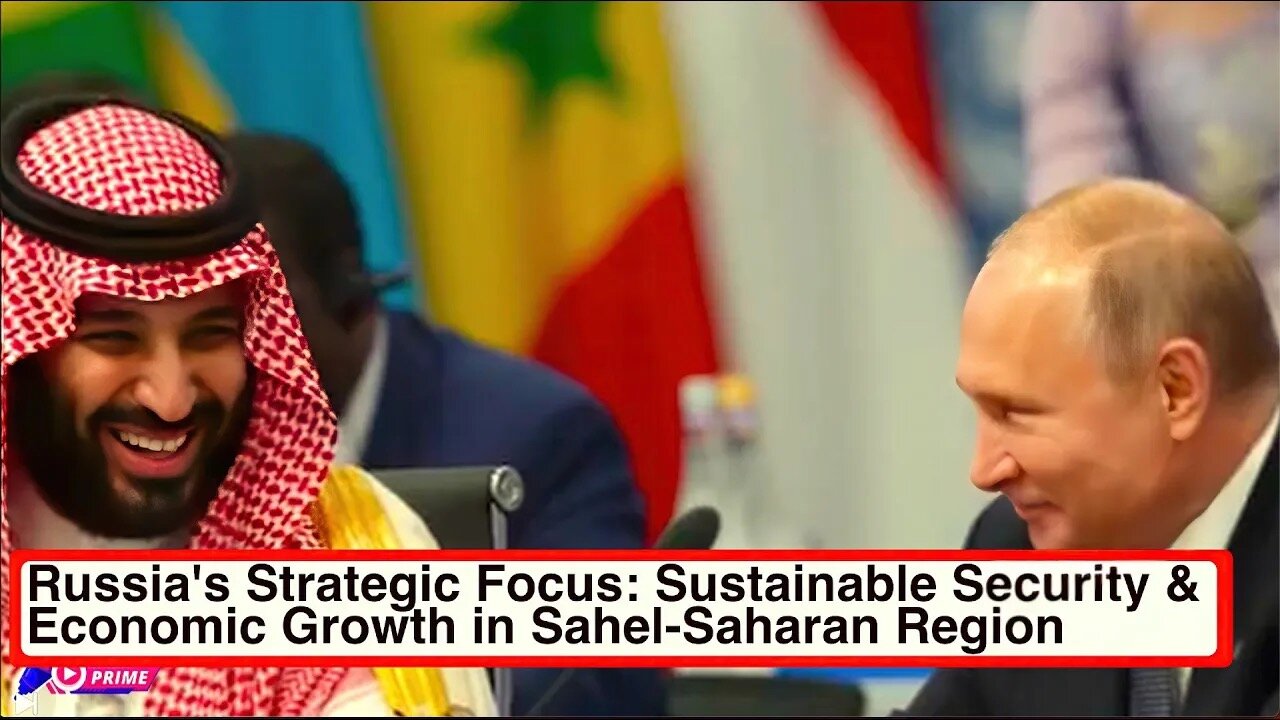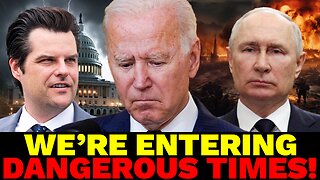Premium Only Content

Russia's Strategic Focus: Sustainable Security & Economic Growth in Sahel-Saharan Region
Russia's Strategic Focus: Sustainable Security & Economic Growth in Sahel-Saharan Region
Russia's engagement in the Sahel-Saharan region is driven by a combination of strategic, security, and economic considerations. As the region faces complex challenges such as terrorism, armed conflicts, and economic underdevelopment, Russia recognizes the importance of addressing these issues to achieve sustainable security and stability. This comprehensive approach has shaped Russia's priorities in the Sahel-Saharan region, focusing on security cooperation, diplomatic engagement, and economic partnerships.
Firstly, Russia places significant importance on addressing the security challenges in the Sahel-Saharan region. The rise of extremist groups such as Boko Haram, Al-Qaeda in the Islamic Maghreb (AQIM), and ISIS (Islamic State of Iraq and Syria) poses a threat not only to the regional stability but also to global security. Russia's primary objective is to counter these extremist groups and assist the countries in this region in their fight against terrorism.
Russia has engaged in military cooperation, providing equipment, training, and technical assistance to the national armed forces in the Sahel-Saharan countries. This support aims to enhance their capabilities to combat terrorism effectively and protect their borders. Additionally, Russia actively participates in regional security initiatives like the G5 Sahel Joint Force, which brings together Burkina Faso, Chad, Mali, Mauritania, and Niger to cooperate on counterterrorism efforts.
Secondly, Russia recognizes the importance of a diplomatic approach to address the complex conflicts in the Sahel-Saharan region. Russia actively engages with regional organizations such as the African Union and the Economic Community of West African States (ECOWAS) to facilitate dialogue, mediations, and peacekeeping efforts. Russia understands that sustainable security in the region can only be achieved by promoting dialogue, reconciliation, and peaceful resolution of conflicts.
Furthermore, Russia has supported the peacekeeping efforts in Mali, contributing to the United Nations Multidimensional Integrated Stabilization Mission in Mali (MINUSMA). By participating in peacekeeping operations, Russia demonstrates its commitment to maintaining stability and fostering peaceful coexistence in the Sahel-Saharan region.
Lastly, Russia recognizes the importance of economic development as a fundamental pillar of sustainable security. Economic underdevelopment and inadequate social infrastructure exacerbate the challenges faced by the Sahel-Saharan countries, making them vulnerable to extremism and conflict. Russia aims to strengthen economic ties with the region, focusing on sectors such as infrastructure development, energy, agriculture, and mining.
Russia has initiated several economic partnerships and investment projects in the Sahel-Saharan region. For instance, Russia has undertaken infrastructure development projects, such as the Trans-Saharan Highway, which connects Algeria, Niger, Mali, and Nigeria. This project aims to enhance regional connectivity, boost trade, and stimulate economic growth.
Moreover, Russia has collaborated with Sahel-Saharan countries in the energy sector. For example, Russia's state-owned energy company, Rosatom, has been involved in the development of nuclear energy in Niger. These investments in the energy sector aim to enhance the energy security and promote sustainable economic development in the region.
Russia's engagement in the Sahel-Saharan region prioritizes sustainable security and strategic economic questions. Russia's comprehensive approach includes security cooperation, diplomatic engagement, and economic partnerships. By addressing the security challenges, promoting diplomatic efforts, and investing in economic development, Russia aims to contribute to the stability, prosperity, and sustainable future of the Sahel-Saharan region.
-
 DVR
DVR
Stephen Gardner
36 minutes ago🔥BREAKING: Vladimir Putin JUST shocked NATO | Will only negotiate with Trump!
4 -
 LIVE
LIVE
Tundra Tactical
3 hours ago $0.43 earnedTundra Nation Live : The Worlds Okayest Gun Live Stream
1,090 watching -
 17:06
17:06
Professor Nez
1 hour ago🚨BREAKING: Elon Musk to BUY MSNBC!? Dems STUNNED by Brian Williams’ Viral Video!
2.32K10 -
![If You Smell LALALALA What CHiLi IS COOKING!!... #RUMBLETAKEOVER [Overwatch 2]](https://1a-1791.com/video/s8/1/e/s/X/3/esX3u.0kob-small-If-You-Smell-LALALALA-What-.jpg) LIVE
LIVE
CHiLi XDD
3 hours agoIf You Smell LALALALA What CHiLi IS COOKING!!... #RUMBLETAKEOVER [Overwatch 2]
696 watching -
 LIVE
LIVE
Delnorin Games
3 hours ago🔴 Live - Star Citizen
374 watching -
 1:39:44
1:39:44
HELMET FIRE
5 hours agoDEADROP IS BACK!
82.6K6 -
 10:03
10:03
Tundra Tactical
7 hours ago $8.50 earnedBrandon Herrera Vies Bid for ATF Director!
45.9K8 -
 22:01
22:01
DeVory Darkins
1 day ago $26.58 earnedHakeem Jeffries SHUTS DOWN The View as Matt Gaetz Speaks out
43.9K90 -
 2:02:54
2:02:54
Mally_Mouse
6 hours agoLet's Play!! - Spicy Saturday
30.1K -
 1:33:06
1:33:06
Slightly Offensive
7 hours ago $20.08 earnedAre You Ready for What's Coming Next? | Just Chatting Chill Stream
48.2K32